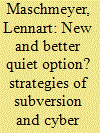| Srl | Item |
| 1 |
ID:
190774


|
|
|
|
|
| Summary/Abstract |
Theorizing on cyber conflict has moved from warfare to conflict short of war, but strategic thought has not kept pace. This article argues cyber conflict is subversive, builds on intelligence scholarship to identify strategies of subversion, and examines their applicability in cyber conflict. It distinguishes three subversive strategies: manipulation, erosion and overthrow. The analysis shows cyber operations can only implement one of these strategies (erosion), indicating they offer less strategic value than traditional counterparts. Accordingly, although cyber operations offer superior scale, I argue their scope of influence is more limited. Finally, the article discusses strategic implications and identifies possible counterstrategies.
|
|
|
|
|
|
|
|
|
|
|
|
|
|
|
|
| 2 |
ID:
181391


|
|
|
|
|
| Summary/Abstract |
Although cyber conflict has existed for thirty years, the strategic utility of cyber operations remains unclear. Many expect cyber operations to provide independent utility in both warfare and low-intensity competition. Underlying these expectations are broadly shared assumptions that information technology increases operational effectiveness. But a growing body of research shows how cyber operations tend to fall short of their promise. The reason for this shortfall is their subversive mechanism of action. In theory, subversion provides a way to exert influence at lower risks than force because it is secret and indirect, exploiting systems to use them against adversaries. The mismatch between promise and practice is the consequence of the subversive trilemma of cyber operations, whereby speed, intensity, and control are negatively correlated. These constraints pose a trilemma for actors because a gain in one variable tends to produce losses across the other two variables. A case study of the Russo-Ukrainian conflict provides empirical support for the argument. Qualitative analysis leverages original data from field interviews, leaked documents, forensic evidence, and local media. Findings show that the subversive trilemma limited the strategic utility of all five major disruptive cyber operations in this conflict.
|
|
|
|
|
|
|
|
|
|
|
|
|
|
|
|